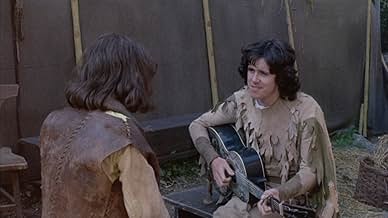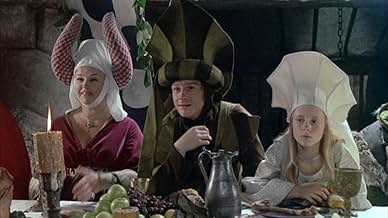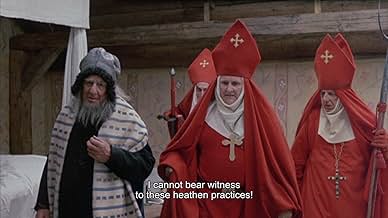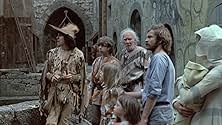IMDb RATING
6.3/10
1K
YOUR RATING
In 1349, while the Black Plague threatens Germany, a troupe of acrobats and musicians arrives in the town of Hamelin a few days before the mayor's daughter's wedding.In 1349, while the Black Plague threatens Germany, a troupe of acrobats and musicians arrives in the town of Hamelin a few days before the mayor's daughter's wedding.In 1349, while the Black Plague threatens Germany, a troupe of acrobats and musicians arrives in the town of Hamelin a few days before the mayor's daughter's wedding.
Featured reviews
I had seen this one ages ago on local TV, back in the early 1980s when our set was still in black-and-white! Naturally, I welcomed Paramount’s idea to let Legend Films release it on DVD albeit bare-bones, and I luckily happened upon it in (arguably) Malta’s best-stocked DVD rental store when it comes to vintage Hollywood movies.
I’ve been a fan of Fairy Tales every since early childhood when illustrated Maltese translations of the Brothers Grimm’s famous stories where constant companions during the Summer holidays and, when my main interest migrated to film, I eagerly sought out examples of this type. The French seemed to do the genre particularly well – Ladislaw Starewicz’s delightful pioneering puppet classic THE TALE OF THE FOX (1931), Jean Cocteau’s enchanting LA BELLE ET LA BETE (1946) and the charming animated fable LE ROI ET L’OISEAU (1979). Jacques Demy also tried his hand at this by bringing DONKEY SKIN (1970) to the screen with Catherine Deneuve, Jacques Perrin, Jean Marais and Delphine Seyrig. In fact, THE PIED PIPER was his next project and follows similar lines – even if it’s a British production shot in Germany, though still with an equally remarkable cast: Jack Wild, Donald Pleasence, John Hurt, Michael Hordern, Peter Vaughan, Roy Kinnear, Diana Dors and, in the titular role, folk singer Donovan! The general consensus about Demy is that his career peaked early (late 1960s) and progressed engagingly but unremarkably towards an untimely end (early 1990s); actually, I haven’t seen any of his acknowledged masterpieces yet – I do own THE UMBRELLAS OF CHERBOURG (1964) on R2 DVD, though, and also have the ultra-rare LADY Oscar (1979) in my unwatched pile.
While Maltin gives this version of THE PIED PIPER (incidentally, the 1957 TV-film with Van Johnson and Claude Rains is also available for rental over here) a very generous , most other reviews of the film I’ve come across were usually mixed and less enthusiastic. In fact, I’d say that its unexpectedly grim tone got to be a bit much at times and left one with a sour taste in the mouth; besides, in spite of Demy’s detached approach (with very few close-ups throughout), the whole still felt somewhat claustrophobic. Even so, the actors, the décor, the costumes and the music eventually save the day: Wild has probably his most significant role after OLIVER! (1968) as Jewish alchemist Hordern’s lame assistant; Pleasence and Hurt are truly despicable as greedy father and son and the town’s chief citizens; Kinnear and Dors as the burgomaster and his wife who want to marry off their teenage offspring (Cathy Harrison, Rex’s daughter) to Hurt; Peter Vaughan is a bloodthirsty Bishop who eventually has Hordern burned alive at the stake.
The troupe of traveling players in a plague-ridden medieval town cannot help but raise comparisons with Ingmar Bergman’s THE SEVENTH SEAL (1957), while the onslaught of the rats (at one point coming out of the wedding cake!) might well have influenced a similar scene in Werner Herzog’s NOSFERATU THE VAMPYRE (1979). Finally, Donavan’s score is pleasant if not quite memorable – his performance is equally decent even if, the film’s title notwithstanding, he is not really the main character!
I’ve been a fan of Fairy Tales every since early childhood when illustrated Maltese translations of the Brothers Grimm’s famous stories where constant companions during the Summer holidays and, when my main interest migrated to film, I eagerly sought out examples of this type. The French seemed to do the genre particularly well – Ladislaw Starewicz’s delightful pioneering puppet classic THE TALE OF THE FOX (1931), Jean Cocteau’s enchanting LA BELLE ET LA BETE (1946) and the charming animated fable LE ROI ET L’OISEAU (1979). Jacques Demy also tried his hand at this by bringing DONKEY SKIN (1970) to the screen with Catherine Deneuve, Jacques Perrin, Jean Marais and Delphine Seyrig. In fact, THE PIED PIPER was his next project and follows similar lines – even if it’s a British production shot in Germany, though still with an equally remarkable cast: Jack Wild, Donald Pleasence, John Hurt, Michael Hordern, Peter Vaughan, Roy Kinnear, Diana Dors and, in the titular role, folk singer Donovan! The general consensus about Demy is that his career peaked early (late 1960s) and progressed engagingly but unremarkably towards an untimely end (early 1990s); actually, I haven’t seen any of his acknowledged masterpieces yet – I do own THE UMBRELLAS OF CHERBOURG (1964) on R2 DVD, though, and also have the ultra-rare LADY Oscar (1979) in my unwatched pile.
While Maltin gives this version of THE PIED PIPER (incidentally, the 1957 TV-film with Van Johnson and Claude Rains is also available for rental over here) a very generous , most other reviews of the film I’ve come across were usually mixed and less enthusiastic. In fact, I’d say that its unexpectedly grim tone got to be a bit much at times and left one with a sour taste in the mouth; besides, in spite of Demy’s detached approach (with very few close-ups throughout), the whole still felt somewhat claustrophobic. Even so, the actors, the décor, the costumes and the music eventually save the day: Wild has probably his most significant role after OLIVER! (1968) as Jewish alchemist Hordern’s lame assistant; Pleasence and Hurt are truly despicable as greedy father and son and the town’s chief citizens; Kinnear and Dors as the burgomaster and his wife who want to marry off their teenage offspring (Cathy Harrison, Rex’s daughter) to Hurt; Peter Vaughan is a bloodthirsty Bishop who eventually has Hordern burned alive at the stake.
The troupe of traveling players in a plague-ridden medieval town cannot help but raise comparisons with Ingmar Bergman’s THE SEVENTH SEAL (1957), while the onslaught of the rats (at one point coming out of the wedding cake!) might well have influenced a similar scene in Werner Herzog’s NOSFERATU THE VAMPYRE (1979). Finally, Donavan’s score is pleasant if not quite memorable – his performance is equally decent even if, the film’s title notwithstanding, he is not really the main character!
Grimm Brothers tale of a strolling minstrel in 1349 Germany who agrees to rid the village of Hamelin of plague-carrying rats is given a serious, perhaps overly-solemn treatment. Jacques Demy has directed the story in a straightforward fashion, without any humor or playfulness, mystery or beauty (with the exception of the sunrise-heightened finale). Pop singer Donovan is well-cast in the title role, and his music compositions are good even if his songs are not of the Medieval period. The other cast members--top-billed Jack Wild, Donald Pleasance and John Hurt--have very little to do; Wild, in particular, is forced to painfully hobble around with a crutch as an alchemist's assistant. Michael Hordern as Melius, who is unable to conjure a cure for the Black Death and is arrested for being a heretic, gives the picture's finest performance, though his final moment tied to a stake may prove to be too heavy for the movie's supposed 'family audience.' The dank, mildewy locations, period costumes and bedraggled extras all lend a convincing air to the film, but "Piper"'s downbeat nature (not to mention all those rats!) makes it a tough sell. ** from ****
Jacques Demy, at his best, was one of those directors who, like Charlie Chaplin, Akira Kurosawa, Jim Jarmusch, or Ernst Lubitsch, could ascend to the ranks of the greats without possessing the immense intellectual and artistic faculties of many of his contemporaries (i.e. Bergman, Tarkovsky, Godard, Pasolini, Antonioni, Buñuel, Bresson, et cetera). Unfortunately, Demy was never as consistent or as prolific as Chaplin or Kurosawa, for instance, who released one good-to-great film after another for such an extensive career. Nevertheless, films like "Lola" and particularly "The Umbrellas of Cherbourg" showed that cinema could be masterful without being artistically ambitious. Like Ozu, Demy proved that a true masterpiece could derive from emotional expressiveness, not only intellectual expressiveness.
In addition to this emotional depth, the other impressive facet of Demy's cinema was, of course, his stylistic abilities. "The Umbrellas of Cherbourg" is truly one of the most stylistically impressive films ever made; visually sumptuous on a level entirely of its own. "The Young Girls of Rochefort" also demonstrates Demy's capacity for stylistically rich and luxurious cinema. We can even see it as early as "Le bel indifférent", his 1957 short film based on a Cocteau play.
Resplendent visuals and extreme emotional potency — these two things Demy did as well as just about anyone to ever sit in a director's chair. "The Pied Piper", therefore, was a bit perplexing to me. It wasn't by any means poorly filmed, but like "The Model Shop", Demy's other previous film made outside of France, it simply lacked his usual flare for lush and lavish visuals. By comparison to his French films, "The Pied Piper" is very mundane, aesthetically speaking.
As for the emotional potency, there is very little. There's not much plot, which in and of itself is absolutely fine by me, but the film seems to lack the emotional punch that we're used to from Demy, although naturally that will vary from person to person, to some degree.
Furthermore, although the film is definitely a fantasy, which is in keeping with Demy's last film, "Donkey Skin", it is really quite gloomy in its mood. Demy, who is usually so filled with life and energy, is quite dreary here. Of course, "The Model Shop", an American film, was also rather dull in tone and lifeless compared to his usual work, so perhaps Demy is a product of his environment. Perhaps his milieu determines the nature of his films. Working in France, his films tend to be filled to the brim with warmth and vibrancy. Outside of France, he seems to be another filmmaker all together.
"The Pied Piper" is also extremely cynical. Demy, who has always been the classic romantic, takes a completely different look at humanity in this film. Instead of his characteristic enthusiasm for life and romantic fervor, "The Pied Piper" is deprived of anything that could be perceived as the kind of life-affirming fun and joyousness that permeated most of his previous films. Truly, he is unrecognizable here.
The film, which is set in Germany in the 1300s, satirizes the Catholic Church and politicians, among other things, and paints a very grim portrait of humanity. It stars Jack Wild, John Hurt, Donald Pleasence, and others, including Donovan, who composed and performed the music for the film. As far as that goes, let's just say he's no Michel Legrand. One of the most ridiculous aspects of the film was the way that '60s/'70s culture so obtrusively pervaded a film that was meant to be set in the 14th century. Throughout the film, Donovan plays music on a style of six-string guitar that I'm almost certain did not exist at the time, and the music he plays sounds so laughably like the '60s/'70s that it became difficult to take anything I was seeing seriously. Generally a period piece makes an effort to disguise the modernity of its production, but not here.
At times this film reminded me of the later work of Roberto Rossellini, such as "Blaise Pascal", "Cartesius", and especially "The Age of the Medici". Needless to say, those were historical films, and Demy's film is a fantasy, but the style and tone of the films are similar in some ways.
While "The Pied Piper" is not truly a musical, Donovan's score and the songs he plays on a few occasions during the film certainly are a large part of defining the overall feel of the film, and he simply can't do for "The Pied Piper" what Legrand was able to do for "The Umbrellas of Cherbourg" or even "The Young Girls of Rochefort". Donovan's music here just isn't very good, and it contributes nothing of any real value to the film.
At the end of the day, this film represents to me the paragon of mediocrity. It is certainly not a bad film, and certainly not a good one. The most interesting parts of the film are the social commentary and satire that Demy delivers with a surprisingly scathing and uncompromising bluntness, but even there, the film doesn't really say anything new or different than what we've seen many times before in cinema: Authority is corrupt and human vice takes root where man attempts to attain or maintain power. Demy exposes religious officials' use of apparent piety and ecclesiastical values as a thinly veiled disguise for greed and immorality. This really isn't anything original or profound in terms of new ideas in cinema, but it's interesting coming from Demy, who I wouldn't have pegged for this kind of cynicism.
I can't say I'd recommend this film, but I don't think it's a real waste of time either. There will inevitably be those with whom the film clicks, but I'm guessing that the majority of experienced filmgoers won't take much away from this one.
RATING: 5.00 out of 10 stars
In addition to this emotional depth, the other impressive facet of Demy's cinema was, of course, his stylistic abilities. "The Umbrellas of Cherbourg" is truly one of the most stylistically impressive films ever made; visually sumptuous on a level entirely of its own. "The Young Girls of Rochefort" also demonstrates Demy's capacity for stylistically rich and luxurious cinema. We can even see it as early as "Le bel indifférent", his 1957 short film based on a Cocteau play.
Resplendent visuals and extreme emotional potency — these two things Demy did as well as just about anyone to ever sit in a director's chair. "The Pied Piper", therefore, was a bit perplexing to me. It wasn't by any means poorly filmed, but like "The Model Shop", Demy's other previous film made outside of France, it simply lacked his usual flare for lush and lavish visuals. By comparison to his French films, "The Pied Piper" is very mundane, aesthetically speaking.
As for the emotional potency, there is very little. There's not much plot, which in and of itself is absolutely fine by me, but the film seems to lack the emotional punch that we're used to from Demy, although naturally that will vary from person to person, to some degree.
Furthermore, although the film is definitely a fantasy, which is in keeping with Demy's last film, "Donkey Skin", it is really quite gloomy in its mood. Demy, who is usually so filled with life and energy, is quite dreary here. Of course, "The Model Shop", an American film, was also rather dull in tone and lifeless compared to his usual work, so perhaps Demy is a product of his environment. Perhaps his milieu determines the nature of his films. Working in France, his films tend to be filled to the brim with warmth and vibrancy. Outside of France, he seems to be another filmmaker all together.
"The Pied Piper" is also extremely cynical. Demy, who has always been the classic romantic, takes a completely different look at humanity in this film. Instead of his characteristic enthusiasm for life and romantic fervor, "The Pied Piper" is deprived of anything that could be perceived as the kind of life-affirming fun and joyousness that permeated most of his previous films. Truly, he is unrecognizable here.
The film, which is set in Germany in the 1300s, satirizes the Catholic Church and politicians, among other things, and paints a very grim portrait of humanity. It stars Jack Wild, John Hurt, Donald Pleasence, and others, including Donovan, who composed and performed the music for the film. As far as that goes, let's just say he's no Michel Legrand. One of the most ridiculous aspects of the film was the way that '60s/'70s culture so obtrusively pervaded a film that was meant to be set in the 14th century. Throughout the film, Donovan plays music on a style of six-string guitar that I'm almost certain did not exist at the time, and the music he plays sounds so laughably like the '60s/'70s that it became difficult to take anything I was seeing seriously. Generally a period piece makes an effort to disguise the modernity of its production, but not here.
At times this film reminded me of the later work of Roberto Rossellini, such as "Blaise Pascal", "Cartesius", and especially "The Age of the Medici". Needless to say, those were historical films, and Demy's film is a fantasy, but the style and tone of the films are similar in some ways.
While "The Pied Piper" is not truly a musical, Donovan's score and the songs he plays on a few occasions during the film certainly are a large part of defining the overall feel of the film, and he simply can't do for "The Pied Piper" what Legrand was able to do for "The Umbrellas of Cherbourg" or even "The Young Girls of Rochefort". Donovan's music here just isn't very good, and it contributes nothing of any real value to the film.
At the end of the day, this film represents to me the paragon of mediocrity. It is certainly not a bad film, and certainly not a good one. The most interesting parts of the film are the social commentary and satire that Demy delivers with a surprisingly scathing and uncompromising bluntness, but even there, the film doesn't really say anything new or different than what we've seen many times before in cinema: Authority is corrupt and human vice takes root where man attempts to attain or maintain power. Demy exposes religious officials' use of apparent piety and ecclesiastical values as a thinly veiled disguise for greed and immorality. This really isn't anything original or profound in terms of new ideas in cinema, but it's interesting coming from Demy, who I wouldn't have pegged for this kind of cynicism.
I can't say I'd recommend this film, but I don't think it's a real waste of time either. There will inevitably be those with whom the film clicks, but I'm guessing that the majority of experienced filmgoers won't take much away from this one.
RATING: 5.00 out of 10 stars
Back when I was a (allegedly disturbed) young child, "The Pied Piper of Hamelin" was my absolute favorite fairy-tale. I owned many tapes that were filled with bedtime stories and fairy-tales, but I mostly just listened to "The Pied Piper" because it featured fascinatingly morbid topics like the black plague, child abduction, rat infestations and a mysteriously sinister guy playing the flute. I was always convinced the premise of Robert Browning's eerie poem could form the basis of a series of unimaginably dark horror movies, but unfortunately there aren't that many. This British production, filmed on location in Germany, is a pretty great version but it's incredibly obscure for some reason and I spent an awful long time purchasing a decent copy. Now that I finally own it, I'm both thrilled about re-experiencing the familiar story lines as well as surprised about discovering entirely new story aspects I wasn't even aware of. The new (to me, at least) elements mostly handle about political and religious hypocrisy, so I presume that is the reason why they weren't included in any of the fairy-tale versions I grew up with. But it remains a fascinating story and a fabulously engaging film, only suffering from obvious and regrettable budget restrictions. Director and co-writer Jacques Demy had a clear and personal vision of the story, and it's definitely not a movie for young children to watch. Although never graphic or repulsive, "The Pied Piper" thrives on a disturbing atmosphere and it never evades any controversial themes, like the abuse of political power by the Catholic Church and the arranged marriages with minors. Donovan is excellent as the Piper, passing through Hamelin with a family of traveling circus artists. The burgomaster and the Baron (another splendid role for versatile super-actor Donald Pleasance) supposedly run the secluded little town, but they mainly obey the will of the uncanny red monks that always look over their shoulders. The friendly Jewish alchemist Melius is concerned about a threatening outbreak of the Bubonic plague, the power-hungry son of the Baron (John Hurt) is about to wed the under-aged burgomaster's daughter for financial reasons and the Pied Piper is the only person capable of freeing the town from its rat infestation. The script of this film is well filled and requires your absolute full attention, but the elaboration of the different story lines is highly compelling and the dialogs are enchanting. The costume designs and scenery are terrific and genuinely take you back to the dark and unsettling medieval times. Donovan, primarily a singer, also provides the film with a couple of great songs (most notably "They Call me the Pied Piper" and "Life has its ups and downs") and there are at least two near-brilliant and unforgettable sequences. Namely the rats breaking out of the wedding cake and a harrowing execution scene near the end. If you own "The Pied Piper", it's definitely a film to treasure.
The bubonic plague often began with the death of the rats before it spread to the people. This movie's version of the pied piper seems far closer to the origin of the story than anything else I've seen.
Did you know
- TriviaThe film was considered too dark for a children's film.
- ConnectionsFeatured in Jacquot de Nantes (1991)
- How long is The Pied Piper?Powered by Alexa
Details
- Release date
- Countries of origin
- Official site
- Languages
- Also known as
- The Pied Piper
- Filming locations
- Production companies
- See more company credits at IMDbPro
Contribute to this page
Suggest an edit or add missing content
































